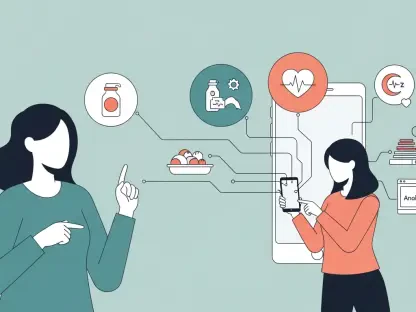In recent years, artificial intelligence (AI) has been increasingly recognized as a game changer in the way healthcare systems operate. This technological advancement is enhancing efficiencies and allowing deeper interactions between healthcare professionals (HCPs) and their patients. The traditional engagement models, which many in the industry believe to be outdated, are being reevaluated as practitioners and pharma companies alike face rising expectations and complex healthcare demands. AI is paving the way for a more informed and connected healthcare ecosystem, driven by data and designed to meet the nuanced needs of today’s physicians and their patients.
Bridging the Engagement Gap with AI
Rethinking Traditional Models
Traditional face-to-face interactions have long been the cornerstone of engagement between pharmaceutical companies and healthcare practitioners. However, these methods are increasingly viewed as resource-heavy and less effective in the current healthcare landscape. The evolving expectations of clinicians require a more customized and responsive approach than what these interactions traditionally offer. As highlighted by various industry reports, there is a noticeable disconnect between how pharmaceutical companies perceive their engagement strategies and how they are received by healthcare professionals. Reimagining these interactions to harness the full potential of AI is crucial for bridging this gap.
The digital transformation driven by AI is multifaceted, offering capabilities that go beyond merely supplementing human interactions. It involves the integration of machine learning algorithms and real-time data analytics to predict outcomes and streamline operations. This advanced understanding and use of data analytics allow for more precise targeting and interaction tailored to the individual’s needs. The move towards AI-driven engagement reflects a shift from a broad-brush, one-size-fits-all approach to a more segmented, strategic method that efficiently taps into the intricate workings of healthcare delivery systems.
Strategic AI Integration
The integration of AI into healthcare engagement is strategic, emphasizing flexibility and personalization across multiple touchpoints. By adopting AI, healthcare organizations can create robust frameworks that guide interactions in a more insightful, data-driven manner. AI-generated insights can pinpoint the best avenues for engagement, ensuring that communication remains relevant and impactful at every point of contact. This strategic application isn’t just about technology adoption; it’s about fundamentally changing the engagement paradigm to be more responsive to the behavioral trends and preferences of healthcare professionals.
AI’s ability to transform vast amounts of data into meaningful insights supports targeted strategies that maximize impact. As evidence shows, tailored communication constructs that blend behavioral data with past interactions are more likely to resonate, leading to better engagement outcomes. Furthermore, AI facilitates the reduction of unnecessary high-frequency promotions, allowing a more refined and precise outreach that appreciates the complexity of modern healthcare challenges. Organizations employing AI in their engagement strategies are better positioned to foster meaningful connections with healthcare professionals, underscoring the transformative potential of AI-driven solutions.
Enhancing Physician Interaction through AI
The Power of Predictive Analytics
Predictive analytics in healthcare is revolutionizing how clinicians interact with pharmaceutical companies. AI’s ability to process extensive behavioral and prescribing data allows for identifying the optimum timing and content customization for engaging healthcare professionals. With such personalization, AI increases not only the efficiency of outreach but also ensures that communications are thoroughly relevant, ultimately leading to more timely and appropriate medication use. The field has seen a growing acceptance of AI-generated content, with a significant number of physicians already open to integrating AI insights in their interactions with pharma companies.
The impact of AI-driven predictive analytics extends beyond interaction optimization; it supports the broader objectives of advanced healthcare delivery systems. With AI, organizations can anticipate healthcare trends and pivot swiftly to address them, reducing times to diagnosis and intervention. Moreover, AI is aiding in the creation of more robust databases that capture real-time healthcare dynamics, ensuring that organizations remain agile and responsive. This provides a framework within which clinicians can feel supported, informed, and able to deliver care that meets the ever-changing needs of patients.
Workflow Automation in Practice
AI also plays a crucial role in automating administrative and clinical processes within the healthcare sector. Tools such as AI-driven ambient listening capture and summarize clinical notes without interrupting the flow of patient care, significantly enhancing healthcare professionals’ efficiency. These tools not only reduce the administrative burden on doctors but also improve the accuracy and timeliness of documentation. The automation of routine tasks empowers healthcare professionals to focus more on patient care, enriching the quality of interaction and care delivery.
Patient-facing applications of AI, such as chatbots and virtual assistants, further demonstrate AI’s growing role in healthcare. These tools handle numerous inquiries, provide symptom assessments, and offer educational information, thereby alleviating pressure on healthcare workers and allowing them to concentrate on more complex clinical cases. As adoption among physicians and patients increases, so does confidence in AI’s ability to transform care systems. By streamlining operations and enhancing service delivery, AI is making healthcare systems more responsive and effective.
The Path Forward: Embracing AI in Healthcare
Strengthening Data Collaboration
Innovation in healthcare calls for a collaborative approach between commercial, clinical, and data teams, with AI at the core. This involves more than just adopting new technologies; it’s about rethinking how these teams work together to support personalized experiences for healthcare practitioners. By aligning sales, marketing, and analytics with AI tools, organizations can better predict trends and adapt to emerging healthcare phenomena, ensuring their strategies remain current and impactful.
Furthermore, the role of partnerships with AI specialists and data providers is becoming increasingly vital. These collaborations can enrich healthcare datasets, making predictions more accurate and delivery systems more efficient. Organizations are encouraged to pilot AI solutions with small teams to test and refine approaches before scaling them regionally or across various product lines, ensuring that innovations are effectively integrated into existing structures with minimal disruption.
Optimizing Future Healthcare Engagements
AI is emerging as a transformative force in reshaping healthcare systems. By streamlining processes and fostering meaningful ties between healthcare professionals and patients, AI is revolutionizing how the industry functions. Traditional models of engagement, now seen as outmoded, are being scrutinized. This shift is prompted by the growing expectations and intricate healthcare demands faced by both practitioners and pharmaceutical companies. AI is ushering in a more informed and cohesive healthcare ecosystem, driven by data and tailored to the specific needs of today’s clinicians and their patients. It empowers caregivers with insights, enhancing diagnostics and personalized treatment. The integration of AI supports preventive care and streamlines administrative tasks. As AI continues to evolve, it promises to refine and redefine patient care, paving the way for a future where healthcare delivery is more efficient and empathetic.









